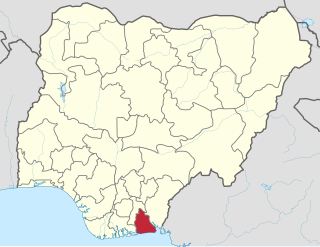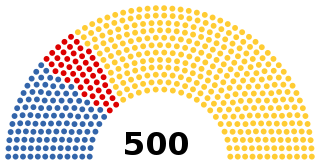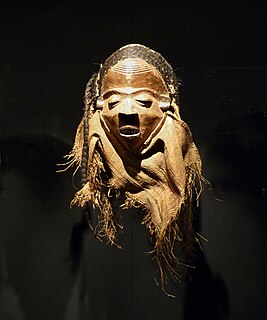Related Research Articles

Akwa Ibom State is a state in the South-South geopolitical zone of Nigeria, bordered on the east by Cross River State, on the west by Rivers State and Abia State, and on the south by the Atlantic Ocean. The state takes its name from the Kwa Ibo River which bisects the state before flowing into the Bight of Bonny. Akwa Ibom was split from Cross River State in 1987 with its capital as Uyo and with 31 local government areas.

Kikwit is the largest city of Kwilu Province, lying on the Kwilu River in the southwestern part of the Democratic Republic of the Congo. Kikwit is also known in the region under the nickname "The Mother". The population is approximately 458,000 (2017). An important commercial centre, it is home to a stadium and is known for its traditional dances, in particular the Bapende dancers whose geographic origin centers on the village of Gungu. Bapende dancers often wear traditional costumes comprising colorful masks and attire made from raffia. Kikwit is also home to an airport and is connected to the capital Kinshasa by a new road and river transport.

Kimbundu, a Bantu language which has sometimes been called Mbundu or 'North Mbundu', is the second-most-widely-spoken Bantu language in Angola.
La Nya Pendé or Nya Pendé is one of six departments in Logone Oriental, a region of Chad. Its capital is Goré.
La Pendé or Pendé is one of six departments in Logone Oriental, a region of Chad. Its capital is Doba.

The National Assembly is the lower house and main legislative political body of the Parliament of the Democratic Republic of the Congo. It was established by the 2006 constitution.

Pendé is a commune in the Somme department in Hauts-de-France in northern France.

Idiofa is a town in Kwilu Province of the Democratic Republic of the Congo.
The Great Lakes Bantu languages, also known as Lacustrine Bantu and Bantu zone J, are a group of Bantu languages of East Africa. They were recognized as a group by the Tervuren team, who posited them as an additional zone to Guthrie's largely geographic classification of Bantu.

The Pende people, also known as the Phende people, are an ethnic group in the south-western Democratic Republic of the Congo. The Pende are divided into two cultural groups: the Eastern Pende and the Western Pende who are distinct but consider themselves part of the same ethnic group. The number of people who consider themselves to be ethnically Pende is estimated at over 250,000.
Lele is a language spoken mainly in the west edge of the Kasai-Occidental Province, in Ilebo and Tshikapa territories; the extreme east of the Bandundu Province, in Idiofa and Gungu territories of the Democratic Republic of the Congo.

Idiofa Airport is an airport serving Idiofa, a city in Bandundu Province, Democratic Republic of the Congo.
Gungu is a Bantu language spoken by the Gungu people in western Uganda.

Kwilu is one of the 21 new provinces of the Democratic Republic of the Congo created in the 2015 repartitioning. Kwilu, Kwango, and Mai-Ndombe provinces are the result of the dismemberment of the former Bandundu province. Kwilu was formed from the Kwilu district and the independently administered cities of Bandundu and Kikwit. Bandundu retained its status as a provincial capital.

Idiofa Territory is an administrative area in the Kwilu Province of the Democratic Republic of the Congo. The capital is the town of Idiofa.

Gungu is a town in Kwilu Province, Democratic Republic of the Congo (DRC). It is the capital of Gungu Territory. The town lies west of the Kwilu River. The estimated population as of 2012 was 23,893. Gungu is connected to the Congolese Road Network via the RP230 and RP231. Both roads are in a bad condition and the town is only reachable by 4x4 vehicles. As of July 2018, none of the roads in Gungu are paved and the large alleys are overgrown with grass. Only small paths remain that are regularly used by motorcycles. Water supply is provided by pumping water into the town from a nearby stream. There is an electricity network, but as of July 2018, it is not in operation, leaving the town with nearly no power.
The Luele River runs from south to north through Idiofa territory, Kwilu province, Democratic Republic of the Congo. The river starts as a clear stream in a small valley near Idiofa. It grows in size rapidly due to many small tributaries, among which is the Punkulu River, and then meanders through a large valley before entering the Kasai River downstream from Mangai.
The Bunda people or in the Democratic Republic of the Congo are an ethnic group that mostly live in Idiofa Territory, Kwilu District of Bandundu Province. They speak the Mpuono language, spoken by an estimated 165,000 people as of 1972.
Akwa is a Bantu language of the Republic of Congo.

The Kwilu rebellion (1963–1965) was a civil uprising which took place in the West of what is the modern-day Democratic Republic of the Congo. The rebellion took place in the wider context of the Cold War and the Congo Crisis. Led by Pierre Mulele, a follower of ousted Prime Minister Patrice Lumumba, a faction of rebel Maoists staged a revolt against the government in the Kwilu District. Based around the struggle for independence, the rebellion was encouraged by economic, social, and cultural grievances. Supported by communist China, rebels used mainly guerrilla warfare against government forces. The rebellion was concurrent with the Simba Rebellion occurring in other areas of the Congo during this time. While the rebellion was suppressed in the early months of 1965, it had lasting political impacts, leading to the dissolution of Kwilu as an official province.
References
- ↑ Pende at Ethnologue (18th ed., 2015)
- ↑ Jouni Filip Maho, 2009. New Updated Guthrie List Online